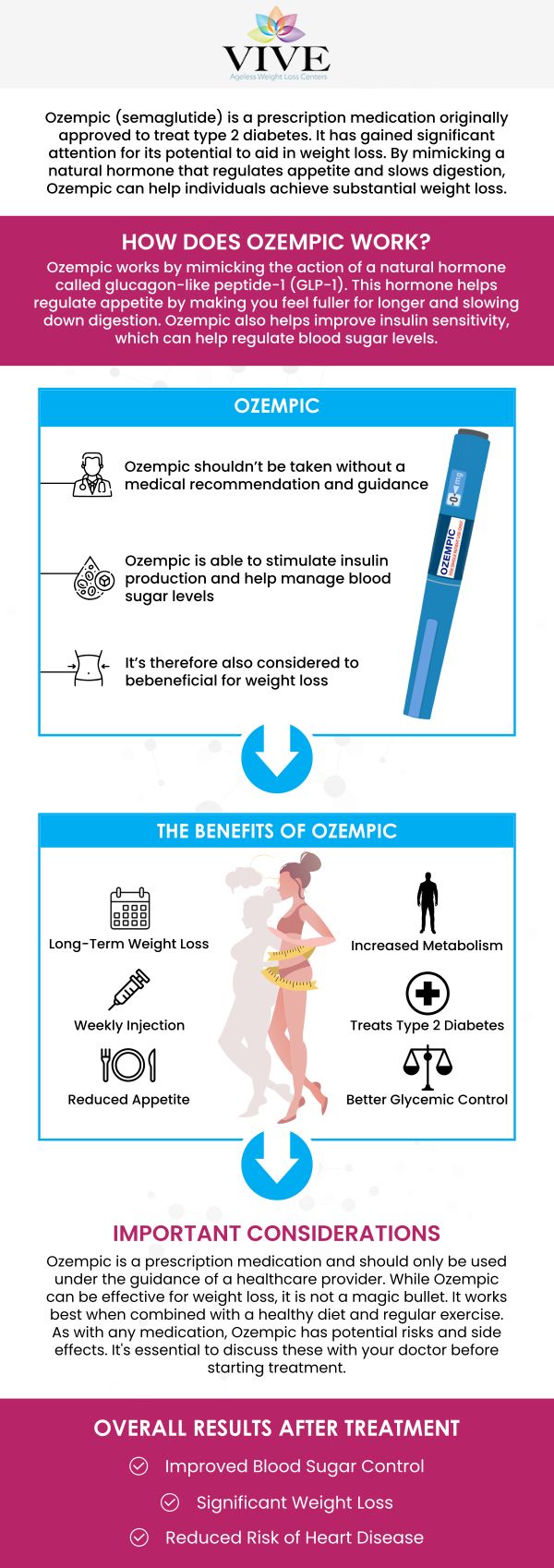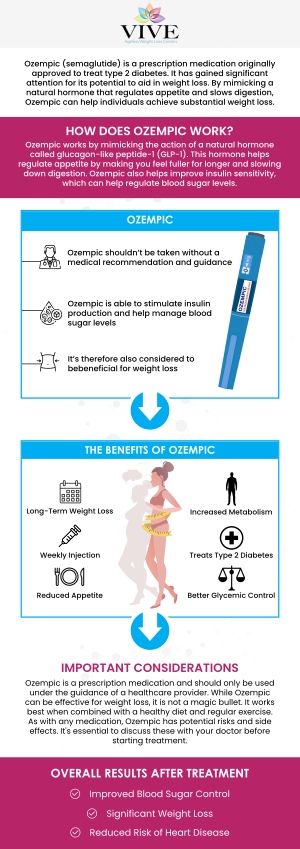Ozempic’s Role in BMI Reduction and Weight Management
Ozempic has gained attention for its potential in weight management. It works by mimicking a hormone that regulates appetite and blood sugar levels, leading to reduced food intake and increased feelings of fullness. While not specifically designed for weight loss, Ozempic has been shown to contribute to significant BMI reduction and improved weight management when used in conjunction with a healthy diet and regular exercise. Rafael Olartecoechea at Vive Ageless Weight Loss Center offers Ozempic for weight loss. For more information, contact us or book an appointment today. We have convenient locations in Coral Gables FL, and Pinecrest FL.


Table of Contents:
How does Ozempic work to lower BMI and support weight loss?
Is Ozempic effective for people with a high BMI?
How long does it take to see changes in BMI with Ozempic?
Can Ozempic help maintain weight loss after reducing BMI?
Ozempic, also known as semaglutide GLP-1. Although primarily used to control type 2 diabetes, Ozempic has been found to support weight loss and reduce body mass index (BMI), making it a potential tool in the fight against obesity.
Ozempic works by mimicking a natural hormone in our body called glucagon-like peptide-1 (GLP-1), which leads to decreased appetite and increased feelings of fullness. It also increases insulin sensitivity, which aids in blood sugar control and metabolic health. Ozempic even slows down the process of gastric emptying, thereby further reducing the desire to eat and helping to control blood sugar levels.
In the studies of animals, Ozempic has been shown to increase energy expenditure and enhance fat oxidation, promoting the breakdown and utilization of stored fat for energy. Some research also indicates that Ozempic may improve cognitive function in overweight or obese individuals, potentially leading to better decision-making and reduced impulsive eating.
Research has indicated that those who are overweight or obese and who take Ozempic can lose a significant amount of weight. However, Ozempic is not a standalone weight loss solution. It’s a diabetes medication that can also help with weight loss. For best effects, it should therefore be combined with behavioral therapy, a balanced diet, and frequent exercise.
At Vive Ageless Weight Loss Center, we understand the challenges that individuals with a high Body Mass Index (BMI) face in their journey to achieve effective weight loss. One of the medications that we consider in our holistic approach to weight loss management is Ozempi.
Ozempic is a glucagon-like peptide (GLP-1) agonist medication that is not only used to manage type 2 diabetes but has also been shown to have substantial benefits for weight loss. It operates by acting similarly to the hormone GLP-1, which signals the brain that you are full, thereby reducing hunger and increasing feelings of fullness.
Research, including the SCALE Obesity and Prediabetes trial, has confirmed the effectiveness of Ozempic for weight loss among people with high BMI. Participants in this trial who were overweight or obese and had prediabetes significantly lost more weight with Ozempic compared to a placebo.
However, we want to emphasize that Ozempic is not a stand-alone solution. For optimal weight management, it ought to be combined with regular exercise and a healthy diet. Also, individuals with high BMI might need a lower initial dose to minimize gastrointestinal side effects and may require a higher maintenance dose for optimal results.
The impact of Ozempic on an individual’s body mass index (BMI) varies greatly from person to person. Factors such as dosage, initial BMI, diet, exercise, metabolic rates, lifestyle habits, and adherence to the treatment plan can significantly influence the timeline for seeing changes.
Most of our patients begin noticing weight loss and changes in their BMI within a few weeks to months of starting Ozempic. Clinical studies have shown that patients using this medication for weight management can expect a significant reduction in their weight and BMI over 26 to 68 weeks. In fact, in a 68-week study, participants receiving Ozempic experienced an average BMI reduction of 12.4%, compared to a 2.4% reduction in the placebo group.
If you have any questions or concerns regarding Ozempic, our group of medical professionals is here to assist. We provide tailored guidance based on your unique health situation and objectives because we know that everyone’s journey is unique. Remember, individual results with Ozempic may vary, but we are committed to helping you navigate your path to better health and weight management.
Semaglutide GLP-1 is an agonist of the glucagon-like peptide-1 (GLP-1) receptor found in Ozempic. The hormone GLP-1 aids in controlling blood sugar, hunger, and gastrointestinal processes. By mimicking the effects of GLP-1, Ozempic can reduce hunger and slow down gastric emptying, lower blood sugar levels, and improve insulin sensitivity, all of which promote a feeling of fullness and lower calorie intake.
Evidence suggests that Ozempic can help people lose weight and maintain that weight loss. In a study published in The Lancet, over the course of 68 weeks, Olympic participants dropped an average of 12.4% of their body weight. After stopping treatment, they maintained 64% of their weight loss after another 52 weeks. In clinical trials, people using Ozempic had significant weight loss compared to those on a placebo, with the weight loss being maintained over time.
The optimal duration of Ozempic use for maintaining weight loss after reducing BMI is not fully established. However, some experts recommend continuing treatment as long as it is effective and well-tolerated.
While Ozempic is generally safe and well-tolerated, common side effects include nausea, diarrhea, vomiting, constipation, and abdominal pain. Consideration should also be given to more severe but uncommon adverse effects, including hypoglycemia, gallbladder illness, and pancreatitis. It’s important to keep in mind that Ozempic shouldn’t be taken as a stand-alone medication, even though it can help sustain weight loss after lowering BMI. It is most effective when combined with a healthy diet and frequent exercise.
If you are considering using Ozempic to help you maintain weight loss after reducing your BMI, consult a doctor at Vive Ageless Weight Loss Center. They can help you decide whether Ozempic is the correct choice for you by going over the advantages and disadvantages. Ozempic can be an effective tool in maintaining weight loss and improving overall health following a reduction in BMI. Nonetheless, it must be used in a thorough weight loss plan that also involves lifestyle modifications. Our clinics are located at two locations in Coral Gables FL, and Pinecrest FL. You can contact us or book an online appointment for both of our locations. We serve clients from Coral Gables FL, Miami FL, Pinecrest FL, South Miami FL, Coconut Grove FL, Brickell FL, Kendall FL, Richmond Heights FL, and Westchester FL.
Check Out Our 5 Star Reviews



Additional Services You May Need
▸ Obesity
▸ Peptide Therapy
▸ Anti-Aging Medicine
▸ Medical Weight Loss
▸ Meal Planning
▸ Nutritional Consultations
▸ Metabolic Insufficiency Treatment
▸ Hormone Imbalance
▸ Inactive Lifestyle
▸ Boost Metabolism
▸ Food Sensitivity/Allergies
▸ Diabetic Weight Loss
▸ Body Mass Index (BMI)
▸ Body Fat Percentage









